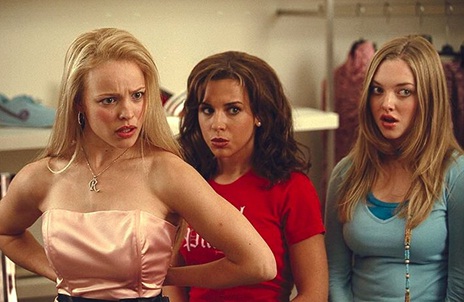girl on girl: female rivalries in media
 In pop culture, plotlines are awash with strong male friendships. We are bombarded with “buddy movies”, bromances, and J.D. & Turk style “guy love” in everything from Superbad to Supernatural. While equivalent female relationships are not exactly in short supply – Lena Dunham’s Girls has been one of the most successful programs of 2013 – there is a disproportionately abundant representation of the antithesis: the fierce female rivalry.
In pop culture, plotlines are awash with strong male friendships. We are bombarded with “buddy movies”, bromances, and J.D. & Turk style “guy love” in everything from Superbad to Supernatural. While equivalent female relationships are not exactly in short supply – Lena Dunham’s Girls has been one of the most successful programs of 2013 – there is a disproportionately abundant representation of the antithesis: the fierce female rivalry.
Bridesmaids, lauded by many critics to be the female Hangover, contains little of the brotherly bonding of its testosterone-fuelled counterpart and instead is filled with petty jealousy and squabbling. Gossip Girl and Mean Girls have no male equivalent, and even How I Met Your Mother has Patrice and Robin. Good television is built on tension and drama, but the offensive part of this trope is that they simply have no depth – it enforces the idea that while male characters may have legitimate reasons to dislike one another, female characters are liable to hate other women simply on the basis of gender. Although it may seem like a small thing, to me it’s the television equivalent of having one’s bad moods reduced to “that time of the month” – shocking though it may be, women are capable of complex emotions and relationships, and to reduce antagonism to baseless gender-based hatred is a sad reflection of the media’s opinion of us.
This attitude is not limited to works of fiction. Men’s magazines such as FHM are approximately one-third vaguely homoerotic photographs of men’s bodies, one-third aggressively heterosexual photographs of women’s bodies, and one-third congratulations on other men’s recent conquests, be they professional, financial or sexual. By contrast, women’s magazines are littered with invitations to judge other women, primarily through snide observation of celebrities’ bodies and sorting them into “good” and “bad”. Though such publications should hardly be held up as the most sophisticated analysis of societal beliefs, they do represent the very basic view that while men are allowed a kind of camaraderie and team spirit, women are encouraged to be highly individualistic and judgemental towards one another. The default attitude towards other women is set at snarky and unfriendly, and pushes for the same simple, unfounded dislike that is displayed on TV and in films.
What is strange is how suddenly this attitude appears. Magazines for younger people, such as Cosmo Girl, are far more based around friendships between one another than their older sister publications. This may be down to the lesser emphasis on rivalries over partners – increasingly sexualised though our culture is, I’m fairly sure that magazines for preteen girls don’t tend to feature articles warning against a ‘new breed of women’ who want to ‘steal your man away’ – but it cannot be this alone; women do not inexplicably become more predatory and vicious over the course of puberty, and yet this is what such discrepancy in magazine content suggests. By the time girls get to be sixteen or so, the stories about embarrassing social situations and advice about family life are gone and replaced with an obsessive focus on appearance, weight, and how women – yourself included – measure up to the impossible standard of beauty and grace imposed by those very same magazines.
Unfortunately, this way of thinking seeps into our lives almost without notice. How many times in your life have you heard someone use the phrase ‘I’m not like other girls’ or ‘I just get on better with men than women’, possibly with the nonsensical qualifier ‘it’s just less drama’? From the moment we begin to engage with adulthood and the various forms of media and entertainment it has to offer, the instinct to distrust or even hate other women is gently encouraged. This internal prejudice is so deep-set in our minds that it can be difficult to recognise as seeming wrong – sadly, to react to a particularly attractive or successful woman with hostility is almost a natural reaction.
This girl-hate phenomenon may seem inconsequential to some, but the resistance in media towards women trusting each other is, by my book, something worth remembering. Strong relationships between women are important: they are the cornerstone of feminism and of general social growth. The temptation to equate the successes of other women, especially in the context of “personal achievements” such as losing weight, as an attack on your personage is strong, but it must be fought. Although judgement may be invited over support, scorn over sympathy and jealousy over admiration, by acknowledging these influences and taking a handle on rejecting them, we can begin to reverse years of pointless rivalry and be a part of a better, less gleefully bitchy world. Doing otherwise is merely contributing to a culture of ingrained misogyny and sexism. Strong bonds between women are important; in a world still distinctly lacking in equality, the friendship and support of other women is priceless.

